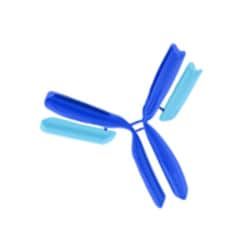ABN20MI
Dopamine D(1A) Receptor Rabbit anti-Rat, Bovine, Polyclonal, MilliporeSigma™
Manufacturer: MilliporeSigma
Select a Size
| Pack Size | SKU | Availability | Price |
|---|---|---|---|
| Each of 1 | ABN20MI-Each-of-1 | In Stock | ₹ 54,736.78 |
ABN20MI - Each of 1
In Stock
Quantity
1
Base Price: ₹ 54,736.78
GST (18%): ₹ 9,852.62
Total Price: ₹ 64,589.40
Antigen
Dopamine D(1A) Receptor
Classification
Polyclonal
Formulation
Purified rabbit polyclonal in buffer containing 0.1M Tris-Glycine (pH 7.4, 150mM NaCl) with 0.05% sodium azide.
Host Species
Rabbit
Purification Method
Affinity Purified
Primary or Secondary
Primary
Target Species
Bovine, Rat
Applications
ELISA, Immunohistochemistry, Western Blot
Conjugate
Unconjugated
Gene Symbols
D1a; Drd1; Drd-1; Drd1a
Immunogen
KLH-conjugated linear peptide of rat dopamine D(1A) receptor at and around the cytoplasmic domain.
Quantity
100 μg
Gene ID (Entrez)
NP_036678
Content And Storage
2-8°C for 12 months
Description
- Anti-Dopamine D(1A) Receptor Antibody detects level of Dopamine D(1A) Receptor and has been published and validated for use in immunohistochemistry, western blot, ELISA.
Compare Similar Items
Show Difference
Antigen: Dopamine D(1A) Receptor
Classification: Polyclonal
Formulation: Purified rabbit polyclonal in buffer containing 0.1M Tris-Glycine (pH 7.4, 150mM NaCl) with 0.05% sodium azide.
Host Species: Rabbit
Purification Method: Affinity Purified
Primary or Secondary: Primary
Target Species: Bovine, Rat
Applications: ELISA, Immunohistochemistry, Western Blot
Conjugate: Unconjugated
Gene Symbols: D1a; Drd1; Drd-1; Drd1a
Immunogen: KLH-conjugated linear peptide of rat dopamine D(1A) receptor at and around the cytoplasmic domain.
Quantity: 100 μg
Gene ID (Entrez): NP_036678
Content And Storage: 2-8°C for 12 months
Antigen:
Dopamine D(1A) Receptor
Classification:
Polyclonal
Formulation:
Purified rabbit polyclonal in buffer containing 0.1M Tris-Glycine (pH 7.4, 150mM NaCl) with 0.05% sodium azide.
Host Species:
Rabbit
Purification Method:
Affinity Purified
Primary or Secondary:
Primary
Target Species:
Bovine, Rat
Applications:
ELISA, Immunohistochemistry, Western Blot
Conjugate:
Unconjugated
Gene Symbols:
D1a; Drd1; Drd-1; Drd1a
Immunogen:
KLH-conjugated linear peptide of rat dopamine D(1A) receptor at and around the cytoplasmic domain.
Quantity:
100 μg
Gene ID (Entrez):
NP_036678
Content And Storage:
2-8°C for 12 months
Antigen: PRCD
Classification: Polyclonal
Formulation: Purified rabbit polyclonal in buffer containing 0.1M Tris-Glycine (pH 7.4), 150mM NaCl with 0.05% sodium azide.
Host Species: Rabbit
Purification Method: Affinity Purified
Primary or Secondary: Primary
Target Species: Mouse
Applications: Immunohistochemistry
Conjugate: Unconjugated
Gene Symbols: PRCD
Immunogen: KLH-conjugated linear peptide corresponding to human PRCD near the C-terminus.
Quantity: 100 μg
Gene ID (Entrez): NP_001071088
Content And Storage: 2-8°C for 12 months
Antigen:
PRCD
Classification:
Polyclonal
Formulation:
Purified rabbit polyclonal in buffer containing 0.1M Tris-Glycine (pH 7.4), 150mM NaCl with 0.05% sodium azide.
Host Species:
Rabbit
Purification Method:
Affinity Purified
Primary or Secondary:
Primary
Target Species:
Mouse
Applications:
Immunohistochemistry
Conjugate:
Unconjugated
Gene Symbols:
PRCD
Immunogen:
KLH-conjugated linear peptide corresponding to human PRCD near the C-terminus.
Quantity:
100 μg
Gene ID (Entrez):
NP_001071088
Content And Storage:
2-8°C for 12 months
Antigen: Tau (TauC4
Classification: Polyclonal
Formulation: Rabbit polyclonal antiserum with 0.1% sodium azide.
Host Species: Rabbit
Purification Method: Unpurified
Primary or Secondary: Primary
Target Species: Human
Applications: Immunomicroscopy, Western Blot
Conjugate: Unconjugated
Gene Symbols: MAPT;MAPTL;MTBT1;TAU
Immunogen: KLH-conjugated linear peptide corresponding to 16 amino acids from the C-terminal half of human Microtubule-associated protein tau, isoform 8 (Tau-F).
Quantity: 100 μL
Gene ID (Entrez): NP_005901
Content And Storage: Stable for 1 year at -20°C from date of receipt. Handling Recommendations: Upon receipt and prior to removing the cap, centrifuge the vial and gently mix the solution. Aliquot into microcentrifuge tubes and store at -20°C. Avoid repeated freeze/thaw cycles, which may damage IgG and affect product performance.
Antigen:
Tau (TauC4
Classification:
Polyclonal
Formulation:
Rabbit polyclonal antiserum with 0.1% sodium azide.
Host Species:
Rabbit
Purification Method:
Unpurified
Primary or Secondary:
Primary
Target Species:
Human
Applications:
Immunomicroscopy, Western Blot
Conjugate:
Unconjugated
Gene Symbols:
MAPT;MAPTL;MTBT1;TAU
Immunogen:
KLH-conjugated linear peptide corresponding to 16 amino acids from the C-terminal half of human Microtubule-associated protein tau, isoform 8 (Tau-F).
Quantity:
100 μL
Gene ID (Entrez):
NP_005901
Content And Storage:
Stable for 1 year at -20°C from date of receipt. Handling Recommendations: Upon receipt and prior to removing the cap, centrifuge the vial and gently mix the solution. Aliquot into microcentrifuge tubes and store at -20°C. Avoid repeated freeze/thaw cycles, which may damage IgG and affect product performance.
Antigen: Tau (TauC4
Classification: Polyclonal
Formulation: Rabbit polyclonal antiserum with 0.1% sodium azide.
Host Species: Rabbit
Purification Method: Unpurified
Primary or Secondary: Primary
Target Species: Human
Applications: Immunomicroscopy, Western Blot
Conjugate: Unconjugated
Gene Symbols: MAPT;MAPTL;MTBT1;TAU
Immunogen: KLH-conjugated linear peptide corresponding to 16 amino acids from the C-terminal half of human Microtubule-associated protein tau, isoform 8 (Tau-F).
Quantity: 25 μL
Gene ID (Entrez): NP_005901
Content And Storage: Stable for 1 year at -20°C from date of receipt. Handling Recommendations: Upon receipt and prior to removing the cap, centrifuge the vial and gently mix the solution. Aliquot into microcentrifuge tubes and store at -20°C. Avoid repeated freeze/thaw cycles, which may damage IgG and affect product performance.
Antigen:
Tau (TauC4
Classification:
Polyclonal
Formulation:
Rabbit polyclonal antiserum with 0.1% sodium azide.
Host Species:
Rabbit
Purification Method:
Unpurified
Primary or Secondary:
Primary
Target Species:
Human
Applications:
Immunomicroscopy, Western Blot
Conjugate:
Unconjugated
Gene Symbols:
MAPT;MAPTL;MTBT1;TAU
Immunogen:
KLH-conjugated linear peptide corresponding to 16 amino acids from the C-terminal half of human Microtubule-associated protein tau, isoform 8 (Tau-F).
Quantity:
25 μL
Gene ID (Entrez):
NP_005901
Content And Storage:
Stable for 1 year at -20°C from date of receipt. Handling Recommendations: Upon receipt and prior to removing the cap, centrifuge the vial and gently mix the solution. Aliquot into microcentrifuge tubes and store at -20°C. Avoid repeated freeze/thaw cycles, which may damage IgG and affect product performance.

